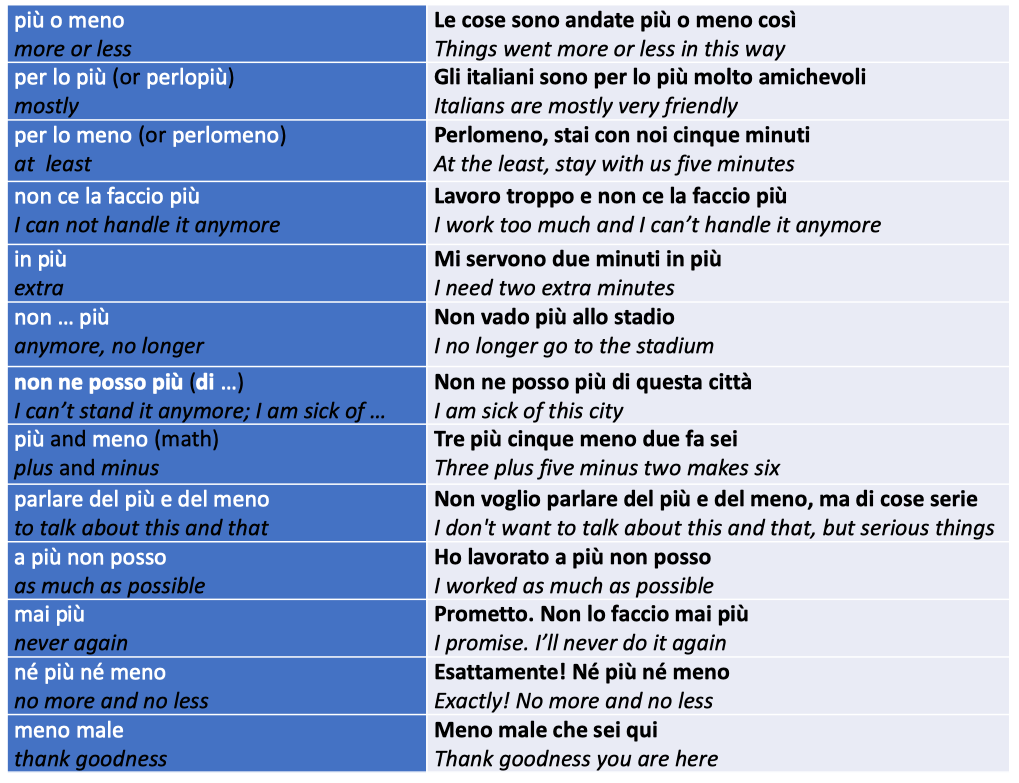| GRAMMAR
Comparative constructions 
The following constructions are used in Italian:
- più + adjective or adverb + di (more/-er … than) or its contraction with an article where necessary:
- Franco è più alto di suo fratello (Franco is taller than his brother)
- La mia auto è più nuova della tua (My car is newer than yours)
- Noi siamo usciti più frequentemente di voi (We went out more frequently than you did)
- meno + adjective, or adverb + di (more/-er … than) or its contraction with an article where necessary:
- Alessandro è stato meno gentile di sua sorella (Alessandro was less kind than his sister)
- La mia bici è meno costosa della tua (My bicycle is less expensive than yours)
- Tu studi meno seriamente di Giovanna (You study less seriously than Giovanna)
- The preposition di (or the articulated preposition del, della, etc.) can sometimes follow directly più or meno without an adjective in between (più di and meno di). This happens exactly when in English the equivalent constructions more than and less than are used:
- La biblioteca contiene più di centomila libri (The library contains more than one hundred thousand books)
- Non posso comprare il giornale perché ho meno di un euro (I can’t buy the newspaper because I have less than one euro)
- Lui ha mangiato più di voi (He ate more than you all)
- che replaces di when the comparison is not between two people, animals, and things, but between two elements, characteristics related to the same person, animal, or thing:
- Mangio più pesce che carne (I eat more fish than meat)
- Il mio cane è più intelligente che forte (My dog is more intelligent than he is strong)
- Gli piace più correre che nuotare (He likes running more than swimming)
- più and meno are used alone when retaining the idea of more or less ‘quantity’ of something but without an explicit comparison. They are exactly the equivalent of the English more and less:
- Devi correre più velocemente You must run faster
- Devi mangiare meno carne You must eat less meat
- più and meno can be preceded by adverbs such as molto, poco, tanto, etc. (see Unità 10.3):
- molto più bello much nicer
- poco meno caro a little less expensive
- di più and di meno are used when they refer directly to the verb and not to an element of the comparison. Note the differenced
- Ieri ho lavorato di meno I worked less yesterday / Ieri ho lavorato meno di oggi Yesterday I worked less than yesterday
Migliore/Peggio and Peggiore/Peggio 
Some adjectives next to the regular comparatives have irregular forms:
più buono/bravo (di) = migliore (di )
better (than) |
meno buono/bravo (di) or più cattivo (di) = peggiore (di )
worse (than) |
The simple expression better (than) can be rendered in Italian with più buono/bravo di, but can be also translated as
- migliore di (sing.)/ migliori di (pl.): Io sono migliore di mio fratello (I am better than my brother), Voi siete migliori di noi (You are better than us)
The simple expression worse (than) can be rendered in Italian with meno buono/bravo (di) or più cattivo (di) but can be also translated as
- peggiore di (sing.)/ peggiori di (pl.): I miei voti sono peggiori dei tuoi (My grades are worse than yours), Tu non hai una bella voce, ma la mia è peggiore (You don’t have a beautiful voice, but mine is worse)
Do not confuse migliore (better meaning ‘more good’) with meglio and peggiore (worse meaning ‘less good’ or ‘more bad’) with peggio. In fact meglio and peggio are the comparative adverbs forms of bene (well) and male (badly). They are equivalent of better and worse but literally meaning ‘more well’ and ‘more badly’: Lia suona il violino meglio di Carla (Lia plays the violin better than Carla), Carla suona il violino peggio di Lia (Carla plays the violin worse than Lia).
Meglio and peggio are commonly used in expressions such as: è meglio (it’s better) and è peggio (it’s worse): è meglio partire domani (it’s better to leave tomorrow), è peggio andare in macchina che in bici (it’s worse going in the car than by bicycle). |
 Note: The constructions Non ce la faccio più and Non ne posso più are very similar and so interchangeable.
Note: The constructions Non ce la faccio più and Non ne posso più are very similar and so interchangeable.